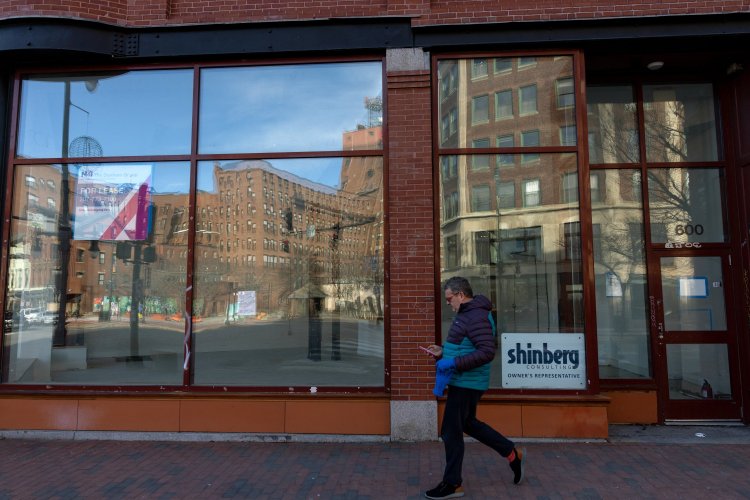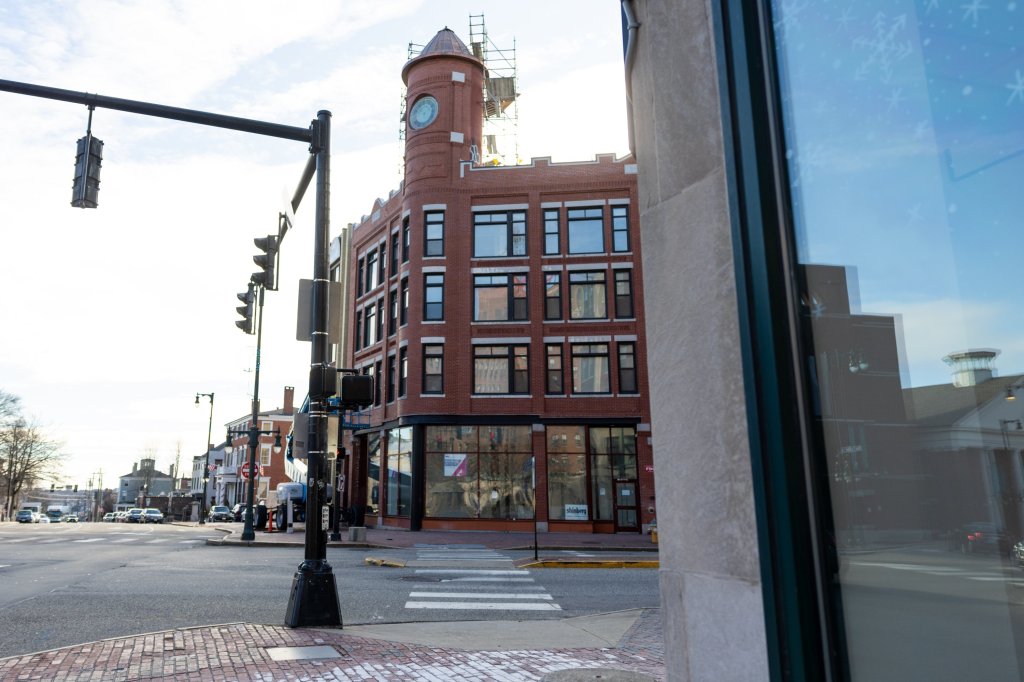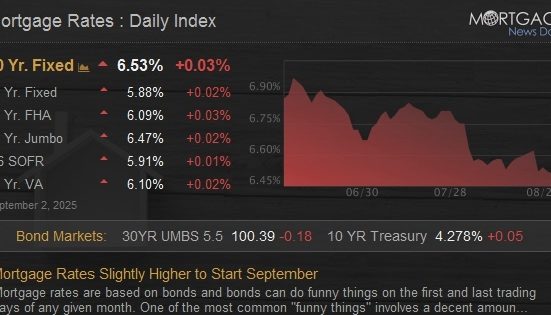

A pedestrian passes a building for lease on the corner of Congress and High streets in Portland in January. (Brianna Soukup/Staff Photographer)
There are roughly 10 storefronts along Congress Street in Portland’s Arts District that are empty — a problem that city staff, property owners and community groups in the neighborhood all agree needs to be addressed.
While the long-vacant Schwartz building on the corner of Congress and High streets has now been leased out to a coffee shop called Y%F after sitting empty for 15 years, popular Maine chain Renys announced in June that it will not renew its lease at a cavernous building in downtown Portland.
This has been the pattern for the last several years: one empty storefront is spruced up and filled, but then another vacancy appears.
On Wednesday, the City Council may nudge owners to rent out their vacant storefronts with a new ordinance that would levy fines on properties that remain vacant too long. It was crafted by city staff after complaints about the impact of Congress Street’s vacancies on the neighborhood reached a fever pitch this fall.
The commercial vacancy ordinance would apply to all city buildings that are zoned for commercial use with storefronts on the ground level in the pedestrian overlay zone. That stretches from State Street to Franklin Street along Congress.
“It does a good job of incentivizing landlords and connecting them with folks who want to rent the spaces … there probably are some landlords who aren’t trying hard to find renters, so then the incentive becomes a penalty,” said Councilor Kate Sykes, who plans to support the ordinance on Wednesday.
The proposal would require commercial property owners to register vacant properties with the city within 30 days of them becoming vacant. Once buildings are registered, the city would then help landlords connect with small business owners, artists, performers or social groups to come up with ways to fill their spaces.
“I want property owners to believe we’re going to roll up our sleeves and be helpful,” Mayor Mark Dion said. “And if the help is real we should never have to talk about the stick. I’ve never met a landlord who just wants to throw their money into a hole without a return.”
If property owners ultimately fail to secure tenants, fines would be levied against them on Jan. 1 of each year. For properties vacant for at least three months but not yet a year, owners would pay the city $250. At one year, the fee jumps t0 $1,000. At two years, $2,000. At three years, $3,500. At five years, $5,000. And at 10 years, $7,500. Each year after that an additional $1,000 in fines would be tacked on.
The ordinance only applies to vacant commercial units on the ground level, not upstairs units.
Owners who install temporary art or pop-up events at vacant properties would be exempt from fines. That’s one part of the ordinance Sykes would like to see strengthened.
“To me that’s really not good enough. I want these spaces to be activated. It’s good that we’ll be working with artists,” she said. “But I want to see more than just a piece of art in the window.”
Councilor Ben Grant said he’s not sure yet how he’ll vote Wednesday.
“I do think it’s an intriguing idea,” he said. “It’s another step we can take to deal with the situation on Congress Street. We want to encourage landlords to fill their spaces. I don’t know if it’s the right tool but I’m glad it’s being brought forward for consideration.”
Dion, who also wasn’t sure late last week how he plans to vote, said he’s hopeful he can have a conversation with his colleagues Wednesday night about the fines. He’s concerned they are too punitive and that businesses may not feel supported.
“There are pieces of the ordinance that I like in terms of supporting financially the vacancies and seeing what we can do to accelerate the signing of leases,” Dion said. “But I’ve got some questions around the punitive elements.”
There have also been numerous concerns raised recently about safety and drug use along the Congress Street corridor and surrounding areas, which spurred the local nonprofit Portland Downtown to create an ambassador program. That initiative launched last month.
Editor’s note: This story was updated on Sept. 2 to include new information about a business moving into the Schwartz building.







